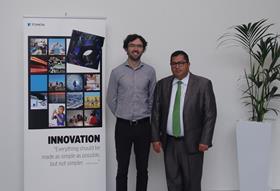
New Zealand-based post-harvest solutions and services provider Compac is looking to play a greater role in the development of Colombia’s horticultural sector.
The company is exploring with central and local authorities, Chambers of Commerce and industry groups opportunities to collaborate in programmes involving farmers’ associations and post-harvest operators with the aim of developing Colombia’s horticulture sector and helping local producers to take advantage of the global markets.
Recently, the company hosted a visit by José Octavio Cardona León, mayor of Manizales in the Caldas department in Colombia, to its development facility on a fact finding mission.
Mayor Cardona’s visit to the Compac facility, organised with the support of New Zealand’s Ministry of Foreign Affairs and Trade and New Zealand Trade and Enterprise, the country’s international business development agency, is part of a fact-finding mission about best practices and technologies capable of supporting the development of Colombia’s horticulture sector, as well as education and tourism.
The meetings focused on how Compac and its partners in Colombia can help the region’s horticulture sector grow and take advantage of global markets. A key area of interest was improving post-harvest operations to enable high-quality export produce.
The horticulture sector is key to the economy of Manizales and the Caldas department, which is Colombia’s second largest producer of Hass avocado with 33 per cent of its total production.
Caldas is also part of the country’s coffee region, known as the ‘Eje Cafetero’ (coffee-growing axis), and is developing its production of mangoes, citrus and stone fruit.
Cardona said the visit to Compac had been very informative and valuable. “On the one hand, it clearly showed New Zealand’s technological and industrial development,” he said.
“On the other hand, it has enabled us to understand the extended agro-industrial model where the processes to guarantee product quality rely on technological equipment, which becomes a strategic partner in the process.”
Compac said it is well placed to support Cardona’s efforts to develop the region’s horticulture sector with its post-harvest solutions.
Having entered the Colombian market in 2018 through an association with Agrosermaq, a company based in Medellín specialising in post-harvest operations, it has already supplied multiple sorting and grading solutions.
“This approach, which leverages a local partner in a best-of-breed model, enables us to meet the specific requirements of each country,” Compac said.
Compac’s most recent project was delivered to Westfalia Fruit Colombia for its plant in Sonsón, in the department of Antioquia.
The facility, which was inaugurated in January 2019, is the largest and most advanced avocado processing plant in the country and features Compac’s latest industry-leading grading and sorting technologies. This project has already received recognition for its contribution to the local community through job creation and increased tax revenue for this rural town.
“The solution Compac installed at the Westfalia Fruit Colombia facility is at the cutting edge of sorting and grading technology and was developed to meet the requirements of their large-scale operation,” explained Jacinto Trigo, Compac’s Latin America regional director.
“However, Compac works with operations of all sizes. We are able to supply solutions for small and medium post-harvest operations that fit their initial requirements and provide a platform to grow alongside the company and meet future export opportunities.
“All these solutions ensure the consistently high quality of product and optimise grading precision. Together with the high quality after sales service that Compac is able to deliver, our technology enables operators to meet their post-harvest processing capacity requirements, minimise waste, and ensure their customers’ satisfaction.”
Compac has a range of tailor-made solutions for the Latin American market, including its Single Lane Sorter (SLS), which offers an entry-level solution with lower start-up costs that provide a platform for the operation to grow and increase capacity to meet future demand.
For the larger scale operations, its Multi Lane Sorting (MLS) systems ensure the highest processing capacities.
“The advancedInspectra2system uses our non-invasive, near-infrared (NIR) technology for testing the internal properties of the produceand deliver consistently high grading accuracy,” the company said.
“We also offer Spectrim, the most powerful optical sorting platform in the industry, developed to address the industry challenges of sorting produce, adding value to packed crops and reducing complexity of operation – all with increased operationefficiency”
Compac said it remains committed to the Colombian market and continues to innovate to ensure that it can meet specific needs of the market.
The company is exploring with central and local authorities, Chambers of Commerce and industry groups opportunities to collaborate in programmes involving farmers’ associations and post-harvest operators with the aim of developing Colombia’s horticulture sector and helping local producers to take advantage of the global markets.
Compac will also be present with a stand in the horticulture pavilion at Agrofuturo, the most important industry events that will take place this year in Medellin, Colombia, from 19-21 September.






No comments yet